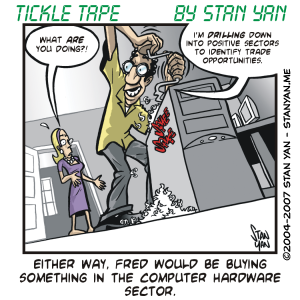Have you ever looked at the performance records of top hedge fund managers? It’s interesting to see how much they fluctuate month to month. Sometimes they may be up 15% while at other times, they may be down 10%. I’m sure the investors in their funds are a little uneasy when they see these dramatic shifts in performance, but such fluctuations are a fact of trading. Part of this fluctuation depends on market psychology. If the market is moving in a clear direction, either bullish or bearish, a skilled trader knows how to make profits from these trends. That said, another part of the equation is psychological. And in the end, it’s the psychological part that tends to be the death of most traders.
Trading can often be a matter of odds. Flip a coin 100 times, and half of the tosses will be headed. But there is the strong possibility that you’ll encounter a long string of tails that far exceeds your expectations. From the vantage point of pure probability, you could end up with a drawdown just as a result of pure chance. It’s at these times that the winning trader shows the proper mindset. Rather than panicking or over-interpreting the slump, a seasoned trader expects such runs of bad luck. Winning traders view such events as a challenge to master, not as something to worry about. It’s a time for them to reevaluate their strategies.
They may close out trades to remove some of the psychological heat and try to look at the circumstances more objectively. Whatever they do, though, they don’t panic. They look at the incident as a time to be creative and innovative. Ironically, when it comes to profits, a winning trader can run hot or cold. But psychologically, a winning trader is always running hot. Their minds are always churning. They have extensive knowledge and experience, and this gives them the rock-solid confidence to know that in the end, they will come out as winners.
Understandably, novice traders have wavering confidence. They don’t have the experience to deal with adverse events easily. In the back of their mind, they wonder, “Is this setback really meaningful, or am I making too much out of nothing?” It’s reasonable to second-guess one’s abilities when you’re a novice. Novice traders tend to make trading errors at the wrong time or misinterpret market events.
And there are times when they make matters worse by over-interpreting setbacks as disasters and panicking. In other words, they may run hot occasionally, but novice traders tend to react with less discipline than is needed. The lesson here: Accurately gauge your trading skills and trade accordingly. If you’re a master trader, then it’s important to trust your instincts. But if you are a novice trader, it’s prudent to be a little more cautious.
Don’t trade beyond your skill level. Realize that you may not have the experience to trust your instincts unconditionally. Trading takes experience and practice, and until you reach the status of a master trader, manage your risk, take it easy and hone your trading skills. Running hot or cold can be seen as a state of mind. If you are taking decisive action that is reasonable and will lead to enduring success in the end, then psychologically, you are running hot.


